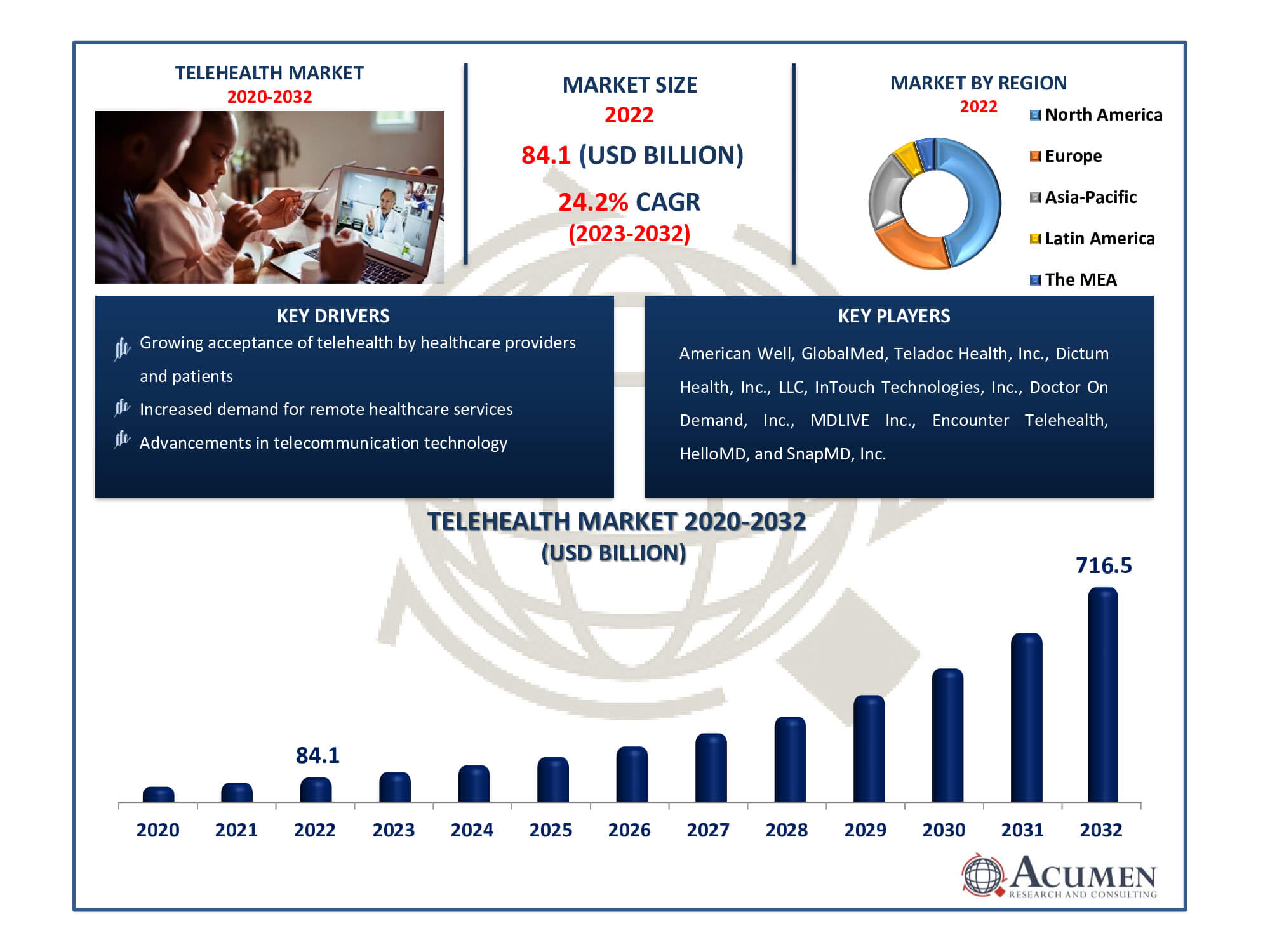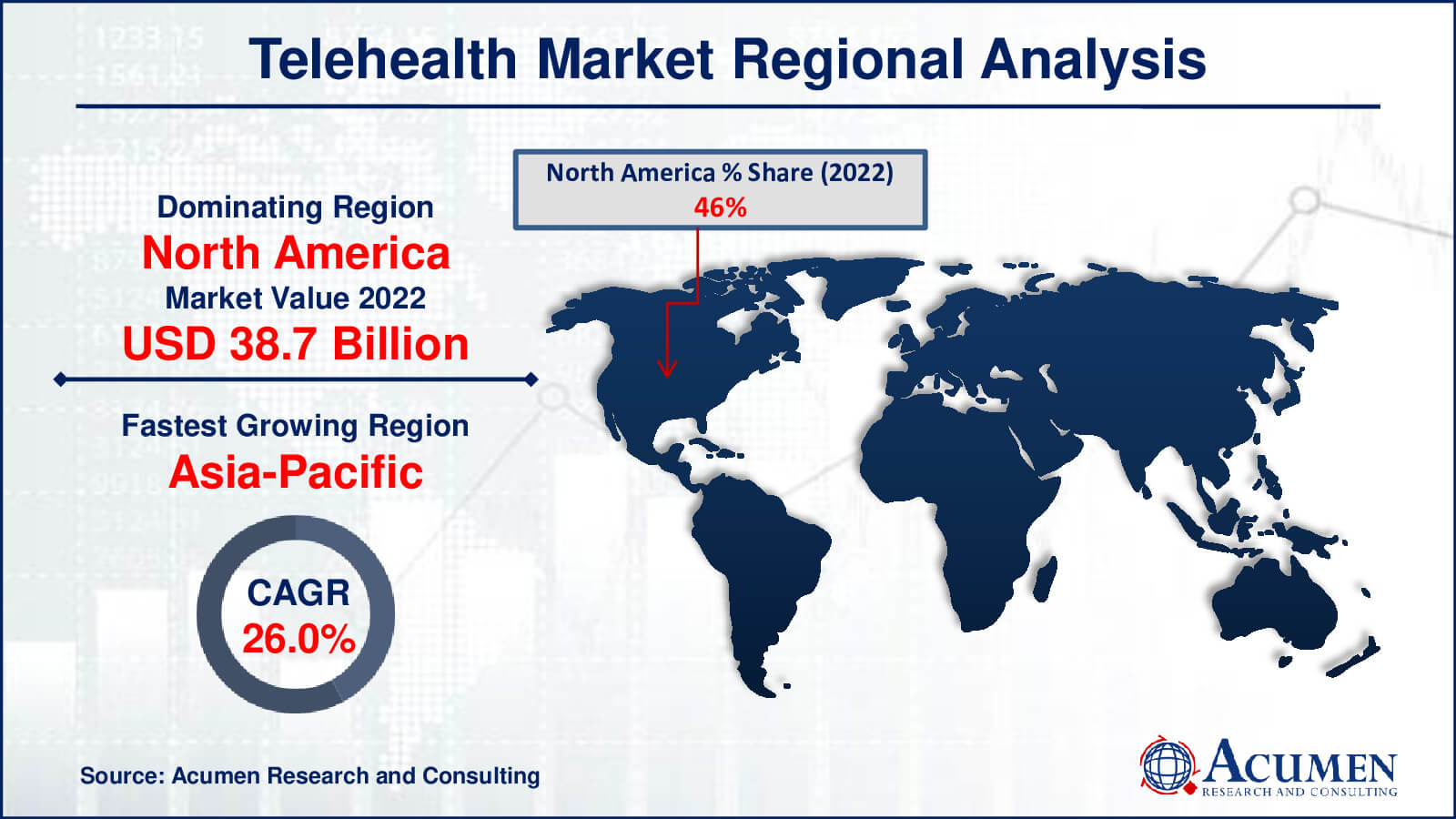Telehealth Market Size - Global Industry, Share, Analysis, Trends and Forecast 2023 - 2032
Published :
Report ID:
Pages :
Format :
Telehealth Market Size - Global Industry, Share, Analysis, Trends and Forecast 2023 - 2032
Report Coverage
- Industry Dynamics
- Market Size and Forecast Data
- Segment Analysis
- Competitive Landscape
- Regional Analysis with a Niche Focus on Country-Level Data
- High Level Analysis - Porter's, PESTEL, Value Chain, etc.
- Company Profiles of Key Players
- Option to Customize the Report As Per Your Specific Need
Request Sample Report
The Telehealth Market Size accounted for USD 84.1 Billion in 2022 and is estimated to achieve a market size of USD 716.5 Billion by 2032 growing at a CAGR of 24.2% from 2023 to 2032.
Telehealth Market Highlights
- Global telehealth market revenue is poised to garner USD 716.5 billion by 2032 with a CAGR of 24.2% from 2023 to 2032
- North America telehealth market value occupied around USD 38.7 billion in 2022
- Asia-Pacific telehealth market growth will record a CAGR of more than 26.0% from 2023 to 2032
- Among component, the services sub-segment generated over US$ 39.6 billion revenue in 2022
- Based on delivery mode, the web-based sub-segment generated around 44% share in 2022
- Collaboration with wearable technology for remote patient monitoring is a popular market trend that fuels the industry demand

Global healthcare standards are evolving rapidly, significantly impacting the healthcare service sector. With the accelerated digitization of both developed and developing countries, accessing healthcare Cloud-based through computers and mobile devices has become more convenient. Telehealth leverages this technology to provide advanced healthcare solutions and better manage patient care. The adoption of these technologies by healthcare professionals aims to enhance the quality and accessibility of healthcare Cloud-based. The growing need for remote healthcare solutions and technological improvements has propelled the telehealth market's recent notable expansion. The term telehealth refers to a broad range of Cloud-based, such as online consultations, patient monitoring from a distance, and telemedicine platforms that allow patients to consult with medical professionals while at home. The desire for more affordable healthcare, the ease of remote consultations, and cost savings are some of the factors driving this market's growth. Telehealth has enormous potential to improve healthcare access and quality globally as it develops.
Global Telehealth Market Dynamics
Market Drivers
- Increased demand for remote healthcare services
- Advancements in telecommunication technology
- Expanding healthcare access in underserved areas
- Growing acceptance of telehealth by healthcare providers and patients
Market Restraints
- Regulatory and reimbursement challenges
- Limited physical examination capabilities
- Data security and privacy concerns
Market Opportunities
- Enhanced chronic disease management and prevention
- Telehealth integration into routine healthcare delivery
- Expansion of telehealth services in mental health
Telehealth Market Report Coverage
| Market | Telehealth Market |
| Telehealth Market Size 2022 | USD 84.1 Billion |
| Telehealth Market Forecast 2032 | USD 716.5 Billion |
| Telehealth Market CAGR During 2023 - 2032 | 24.2% |
| Telehealth Market Analysis Period | 2020 - 2032 |
| Base Year |
2022 |
| Forecast Data | 2023 - 2032 |
| Segments Covered | By Component, By Delivery Mode, By Application, By End-User, And By Geography |
| Regional Scope | North America, Europe, Asia Pacific, Latin America, and Middle East & Africa |
| Key Companies Profiled | American Well, GlobalMed, Teladoc Health, Inc., Dictum Health, Inc., LLC, InTouch Technologies, Inc., Doctor On Demand, Inc., MDLIVE Inc., Encounter Telehealth, HelloMD, and SnapMD, Inc. |
| Report Coverage |
Market Trends, Drivers, Restraints, Competitive Analysis, Player Profiling, Covid-19 Analysis, Regulation Analysis |
Telehealth Market Insights
Factors contributing to the growth of the global telehealth market include the increasing number of patients suffering from chronic diseases, a rise in the geriatric population, and a growing preference for home healthcare. Additionally, favorable reimbursement policies in developed countries and well-established healthcare infrastructure for the adoption of advanced medical devices are among other factors driving market growth. Rapid urbanization in developing countries, high mobile phone penetration, and the introduction of various app-based services are expected to further bolster the market's expansion. Intouch launched SOLO, a fully integrated end-to-end virtual platform designed to enhance patient care. Moreover, the demand for remote monitoring services and video assistance services is expected to continue supporting the market's growth with the introduction of user-friendly technologies.
The growth of the global market has been fueled by technological advancements in healthcare products and services, as well as the introduction of advanced products. The advent of user-friendly systems has contributed to increased demand, further supporting the growth of the global telehealth market to a certain extent. However, the lack of a regulatory framework and favorable policies in developing countries is expected to limit the adoption of these services, thereby hampering the growth of the global telehealth market. Moreover, the absence of the required infrastructure to support the adoption of advanced devices is expected to restrain the market's growth.
Key factors driving the growth of the target market during the forecast period include players' efforts to offer advanced services, the introduction of novel products, and the development of healthcare regulations.
Telehealth Market Segmentation
The worldwide market for telehealth is split based on component, delivery mode, application, end-user, and geography.
Telehealth Component
- Software
- Hardware
- Services
The telehealth industry is dominated by the service sector due to its broad scope of essential and valuable products. Market analysis indicates that virtual consultations, remote monitoring, telemedicine platforms, and support for patients and healthcare professionals are all examples of telehealth services. These services are essential for providing patient care, offering healthcare solutions, and enabling remote medical interactions. Convenience, affordability, and accessibility are driving up demand for telehealth services, and as a result, the service category is well-positioned to take the lead in the market by offering crucial support and enabling efficient healthcare delivery.
Telehealth Delivery Mode
- On-premise
- Web-based
- Cloud-based
The web-based segment has become the industry leader in telehealth, mainly due to its accessibility, flexibility, and strong market forecast. Web-based telehealth solutions make healthcare services widely accessible to a large user base by providing the ease of accessing them from any device with an internet connection. This mode aligns with the current trend towards user-friendly, location-independent, on-demand healthcare interactions, and it is expected to continue its dominance in the industry as market forecasts indicate sustained growth in this delivery modality. Patients and healthcare providers find it simple to interact and share information through web-based telehealth, further cementing its popularity.
Telehealth Application
- Teleconsultation
- Telestroke
- Teleradiology
- Telepsychiatry
- Teledermatology
- Other Applications
Teleradiology occupies the largest portion of the telehealth market income, and market forecasts support its continued growth. This prominence is attributed to its pivotal role in medical imaging and diagnosis, enabling swift and accurate diagnoses by granting medical professionals remote access to and interpretation of radiological images such as CT scans, MRIs, and X-rays. Teleradiology is indispensable, especially in diagnosing strokes during emergencies, and its application extends to a wide spectrum of medical conditions. Its widespread popularity stems from its efficiency, accessibility, and the capacity to connect specialists with various facilities, reinforcing its position as a significant revenue driver for the telehealth industry.
Telehealth End-User
- Healthcare Facilities
- Homecare
- Others
In the telehealth business, the healthcare facilities segment now retains a dominant position because of its advanced infrastructure and well-established healthcare networks, as indicated by market analysis. These facilities can seamlessly incorporate telehealth solutions into their current workflows, allowing for remote patient care, diagnosis, and consultations. They serve as crucial hubs for the adoption of telehealth. Healthcare facilities are the dominant force in the market as they continue to meet the growing demand for easily accessible and effective healthcare services. While homecare and other segments have room to grow, healthcare facilities possess the resources and ability to effectively utilize telehealth technologies.
Telehealth Market Regional Outlook
North America
- U.S.
- Canada
Europe
- U.K.
- Germany
- France
- Spain
- Rest of Europe
Asia-Pacific
- India
- Japan
- China
- Australia
- South Korea
- Rest of Asia-Pacific
Latin America
- Brazil
- Mexico
- Rest of Latin America
The Middle East & Africa
- South Africa
- GCC Countries
- Rest of the Middle East & Africa (ME&A)

Telehealth Market Regional Analysis
The North American market is anticipated to account for a high revenue share compared to other regions. This can be attributed to its well-developed healthcare infrastructure, enabling the provision of advanced services. Additionally, the increasing number of patients suffering from chronic diseases such as cancer and asthma, coupled with a growing trend towards adopting home healthcare services to avoid expensive hospital stays, are expected to boost the growth of the target market in this region. In 2017, the US, with a population of 325 million, spent US$3.5 trillion on healthcare.
Furthermore, merger and acquisition activities by major players to strengthen their position in the global market will further support the growth of the target market. The 2018 acquisition between American Well and Avizia Limited, for instance, will help American Well solidify its position in the North American market and expand its product portfolio.
The Asia Pacific market is expected to witness faster growth in the next few years, driven by high government spending on the healthcare sector. Additionally, a rising patient population suffering from various chronic diseases and the presence of prominent players offering a variety of services are expected to further support the growth of the target market in this region.
Telehealth Market Players
Some of the top telehealth companies offered in our report includes American Well, GlobalMed, Teladoc Health, Inc., Dictum Health, Inc., LLC, InTouch Technologies, Inc., Doctor On Demand, Inc., MDLIVE Inc., Encounter Telehealth, HelloMD, and SnapMD, Inc.
Frequently Asked Questions
How big is the telehealth market?
The market size of telehealth was USD 84.1 billion in 2022.
What is the CAGR of the global telehealth market from 2023 to 2032?
What is the CAGR of the global telehealth market from 2023 to 2032?
Which are the key players in the telehealth market?
The key players operating in the global market are including American Well, GlobalMed, Teladoc Health, Inc., Dictum Health, Inc., LLC, InTouch Technologies, Inc., Doctor On Demand, Inc., MDLIVE Inc., Encounter Telehealth, HelloMD, and SnapMD, Inc.
Which region dominated the global telehealth market share?
North America held the dominating position in telehealth industry during the analysis period of 2023 to 2032.
Which region registered fastest CAGR from 2023 to 2032?
Asia-Pacific region exhibited fastest growing CAGR for market of telehealth during the analysis period of 2023 to 2032.
What are the current trends and dynamics in the global Telehealth industry?
The current trends and dynamics in the telehealth industry include increased demand for remote healthcare services, advancements in telecommunication technology, expanding healthcare access in underserved areas, and growing acceptance of telehealth by healthcare providers and patients.
Which component held the maximum share in 2022?
The services component held the maximum share of the telehealth industry.


